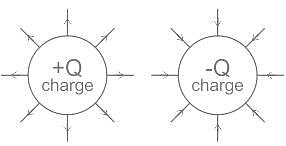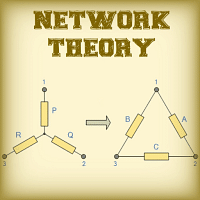Electrical Engineering (EE) Exam > Electrical Engineering (EE) Questions > The electric flux linesa)originate at positiv...
Start Learning for Free
The electric flux lines
- a)originate at positive charge
- b)originate at negative charge
- c)are closed loop
- d)originate at positive charge and terminate at positive charge
Correct answer is option 'A'. Can you explain this answer?
| FREE This question is part of | Download PDF Attempt this Test |
Most Upvoted Answer
The electric flux linesa)originate at positive chargeb)originate at ne...
Electric flux lines originate from positive charges and terminate at negative charges as shown:

Note:
It is the magnetic field lines that form a closed loop as shown:


Note:
It is the magnetic field lines that form a closed loop as shown:

Free Test
FREE
| Start Free Test |
Community Answer
The electric flux linesa)originate at positive chargeb)originate at ne...
Electric Flux Lines
Introduction:
Electric flux lines, also known as electric field lines, are used to visualize the electric field surrounding charged objects. They provide a graphical representation of the direction and strength of the electric field. Understanding the origin and termination of these lines is crucial in understanding the behavior of electric fields.
Origin of Electric Flux Lines:
The electric flux lines originate at positive charges. This is because positive charges are the source of the electric field. When a positive charge is present, it creates an electric field that extends outwards in all directions. The electric flux lines represent the direction and magnitude of this electric field. Hence, the electric flux lines originate at positive charges.
Termination of Electric Flux Lines:
The termination of electric flux lines depends on the charge distribution. In the case of a single positive charge, the electric flux lines extend outwards indefinitely. However, in the case of multiple charges, the termination of the electric flux lines depends on the net charge. If the net charge is positive, the electric flux lines will terminate at positive charges. On the other hand, if the net charge is negative, the electric flux lines will terminate at negative charges.
Closed Loop:
Electric flux lines are not closed loops. They are continuous lines that extend indefinitely in space. This is because the electric field created by a single charge extends to infinity. However, in the presence of multiple charges, the electric flux lines can form closed loops if the charges are arranged in a specific way. For example, if a positive and negative charge are placed close to each other, the electric flux lines will form closed loops between the charges.
Conclusion:
In summary, electric flux lines originate at positive charges, terminate at positive charges if the net charge is positive, and do not form closed loops unless there are specific charge arrangements. Understanding the behavior of electric flux lines is essential in analyzing and predicting the behavior of electric fields.
Introduction:
Electric flux lines, also known as electric field lines, are used to visualize the electric field surrounding charged objects. They provide a graphical representation of the direction and strength of the electric field. Understanding the origin and termination of these lines is crucial in understanding the behavior of electric fields.
Origin of Electric Flux Lines:
The electric flux lines originate at positive charges. This is because positive charges are the source of the electric field. When a positive charge is present, it creates an electric field that extends outwards in all directions. The electric flux lines represent the direction and magnitude of this electric field. Hence, the electric flux lines originate at positive charges.
Termination of Electric Flux Lines:
The termination of electric flux lines depends on the charge distribution. In the case of a single positive charge, the electric flux lines extend outwards indefinitely. However, in the case of multiple charges, the termination of the electric flux lines depends on the net charge. If the net charge is positive, the electric flux lines will terminate at positive charges. On the other hand, if the net charge is negative, the electric flux lines will terminate at negative charges.
Closed Loop:
Electric flux lines are not closed loops. They are continuous lines that extend indefinitely in space. This is because the electric field created by a single charge extends to infinity. However, in the presence of multiple charges, the electric flux lines can form closed loops if the charges are arranged in a specific way. For example, if a positive and negative charge are placed close to each other, the electric flux lines will form closed loops between the charges.
Conclusion:
In summary, electric flux lines originate at positive charges, terminate at positive charges if the net charge is positive, and do not form closed loops unless there are specific charge arrangements. Understanding the behavior of electric flux lines is essential in analyzing and predicting the behavior of electric fields.
Attention Electrical Engineering (EE) Students!
To make sure you are not studying endlessly, EduRev has designed Electrical Engineering (EE) study material, with Structured Courses, Videos, & Test Series. Plus get personalized analysis, doubt solving and improvement plans to achieve a great score in Electrical Engineering (EE).

|
Explore Courses for Electrical Engineering (EE) exam
|

|
Similar Electrical Engineering (EE) Doubts
The electric flux linesa)originate at positive chargeb)originate at negative chargec)are closed loopd)originate at positive charge and terminate at positive chargeCorrect answer is option 'A'. Can you explain this answer?
Question Description
The electric flux linesa)originate at positive chargeb)originate at negative chargec)are closed loopd)originate at positive charge and terminate at positive chargeCorrect answer is option 'A'. Can you explain this answer? for Electrical Engineering (EE) 2024 is part of Electrical Engineering (EE) preparation. The Question and answers have been prepared according to the Electrical Engineering (EE) exam syllabus. Information about The electric flux linesa)originate at positive chargeb)originate at negative chargec)are closed loopd)originate at positive charge and terminate at positive chargeCorrect answer is option 'A'. Can you explain this answer? covers all topics & solutions for Electrical Engineering (EE) 2024 Exam. Find important definitions, questions, meanings, examples, exercises and tests below for The electric flux linesa)originate at positive chargeb)originate at negative chargec)are closed loopd)originate at positive charge and terminate at positive chargeCorrect answer is option 'A'. Can you explain this answer?.
The electric flux linesa)originate at positive chargeb)originate at negative chargec)are closed loopd)originate at positive charge and terminate at positive chargeCorrect answer is option 'A'. Can you explain this answer? for Electrical Engineering (EE) 2024 is part of Electrical Engineering (EE) preparation. The Question and answers have been prepared according to the Electrical Engineering (EE) exam syllabus. Information about The electric flux linesa)originate at positive chargeb)originate at negative chargec)are closed loopd)originate at positive charge and terminate at positive chargeCorrect answer is option 'A'. Can you explain this answer? covers all topics & solutions for Electrical Engineering (EE) 2024 Exam. Find important definitions, questions, meanings, examples, exercises and tests below for The electric flux linesa)originate at positive chargeb)originate at negative chargec)are closed loopd)originate at positive charge and terminate at positive chargeCorrect answer is option 'A'. Can you explain this answer?.
Solutions for The electric flux linesa)originate at positive chargeb)originate at negative chargec)are closed loopd)originate at positive charge and terminate at positive chargeCorrect answer is option 'A'. Can you explain this answer? in English & in Hindi are available as part of our courses for Electrical Engineering (EE).
Download more important topics, notes, lectures and mock test series for Electrical Engineering (EE) Exam by signing up for free.
Here you can find the meaning of The electric flux linesa)originate at positive chargeb)originate at negative chargec)are closed loopd)originate at positive charge and terminate at positive chargeCorrect answer is option 'A'. Can you explain this answer? defined & explained in the simplest way possible. Besides giving the explanation of
The electric flux linesa)originate at positive chargeb)originate at negative chargec)are closed loopd)originate at positive charge and terminate at positive chargeCorrect answer is option 'A'. Can you explain this answer?, a detailed solution for The electric flux linesa)originate at positive chargeb)originate at negative chargec)are closed loopd)originate at positive charge and terminate at positive chargeCorrect answer is option 'A'. Can you explain this answer? has been provided alongside types of The electric flux linesa)originate at positive chargeb)originate at negative chargec)are closed loopd)originate at positive charge and terminate at positive chargeCorrect answer is option 'A'. Can you explain this answer? theory, EduRev gives you an
ample number of questions to practice The electric flux linesa)originate at positive chargeb)originate at negative chargec)are closed loopd)originate at positive charge and terminate at positive chargeCorrect answer is option 'A'. Can you explain this answer? tests, examples and also practice Electrical Engineering (EE) tests.

|
Explore Courses for Electrical Engineering (EE) exam
|

|
Suggested Free Tests
Signup for Free!
Signup to see your scores go up within 7 days! Learn & Practice with 1000+ FREE Notes, Videos & Tests.
























